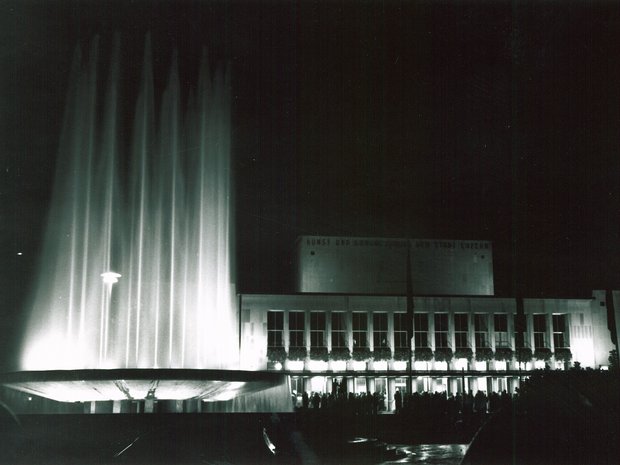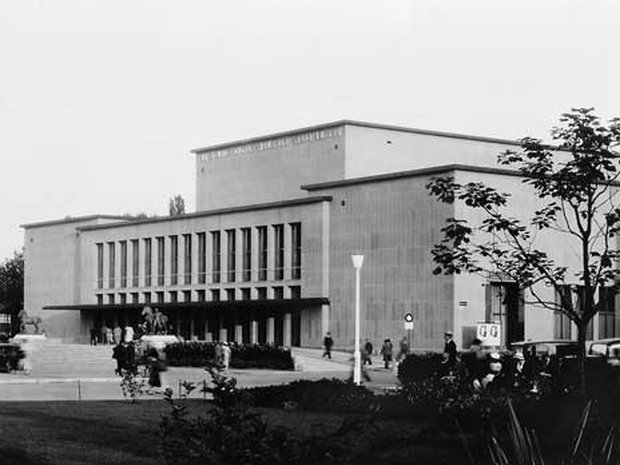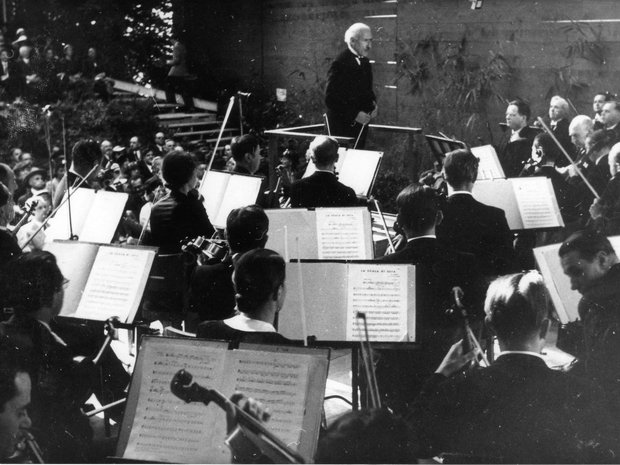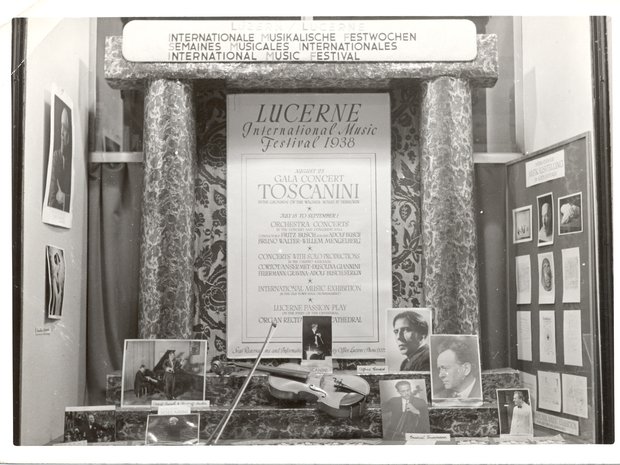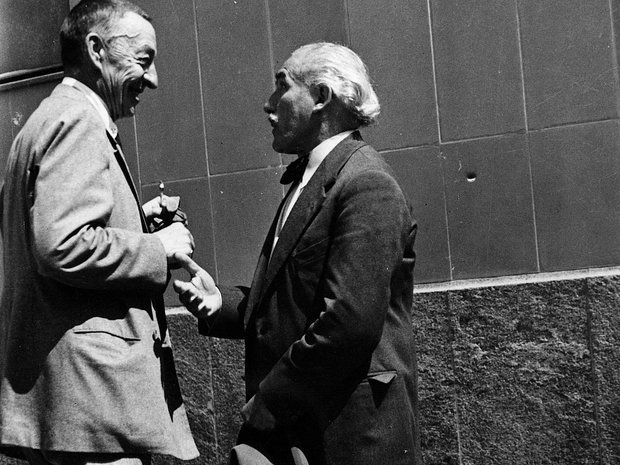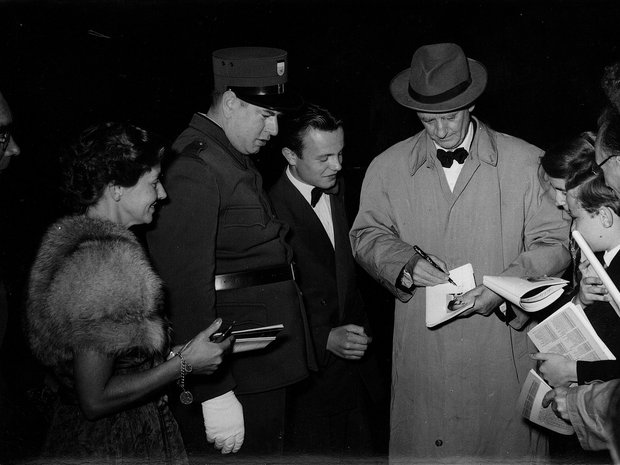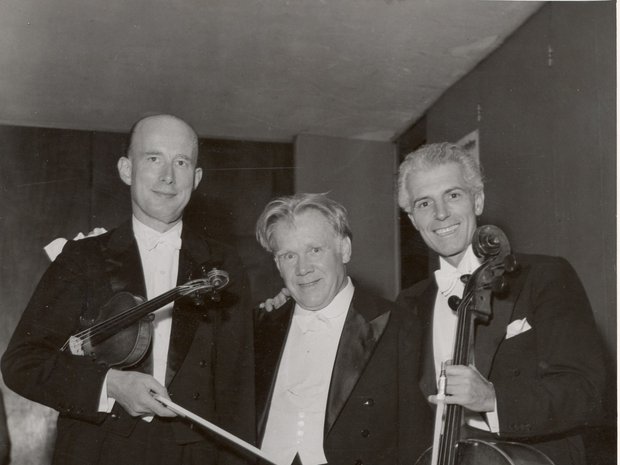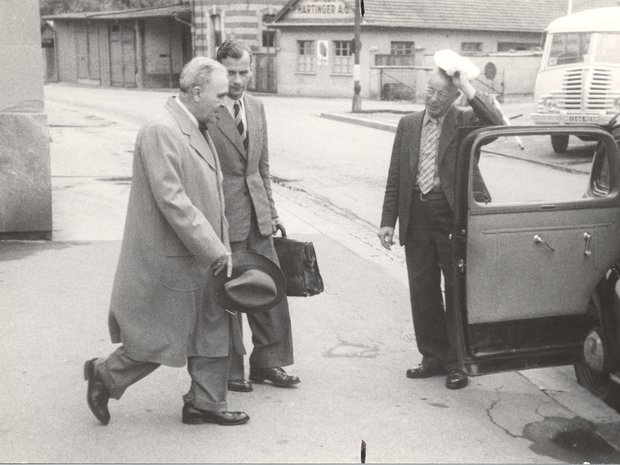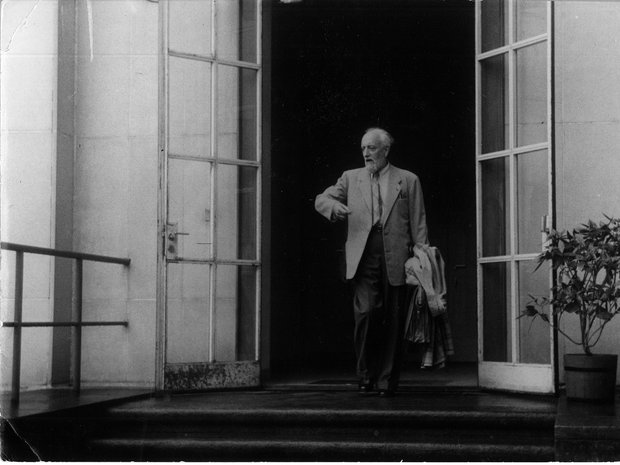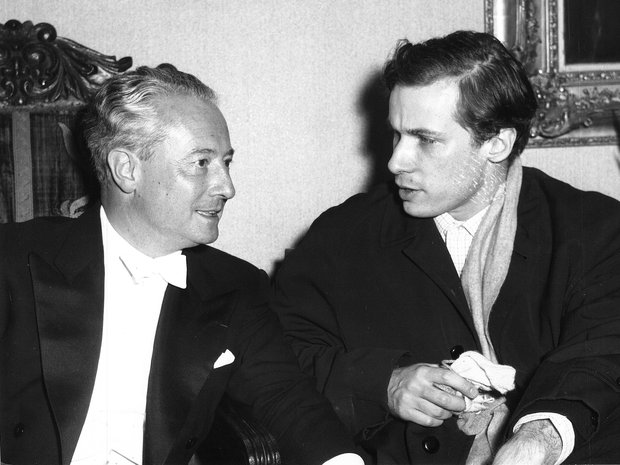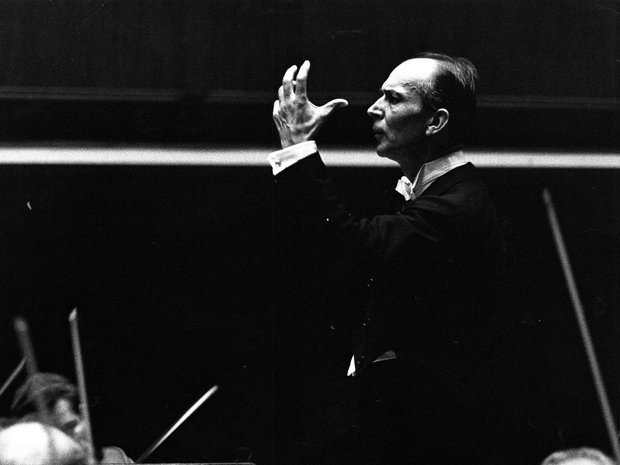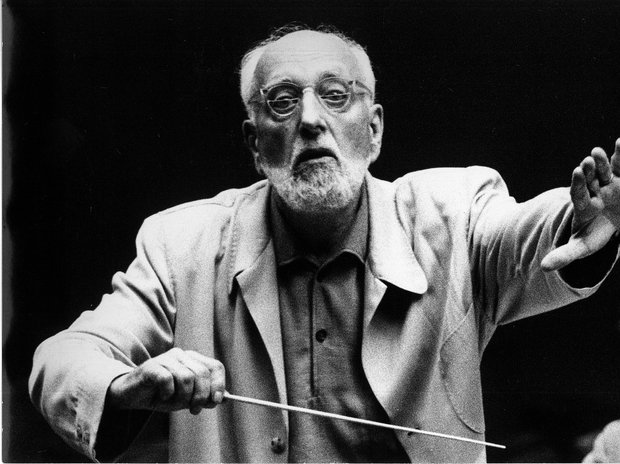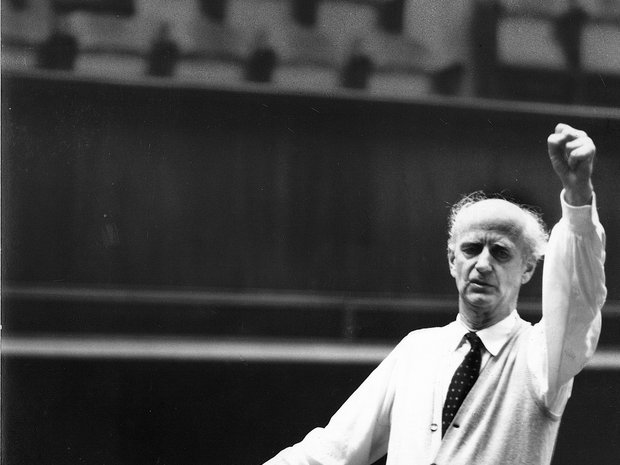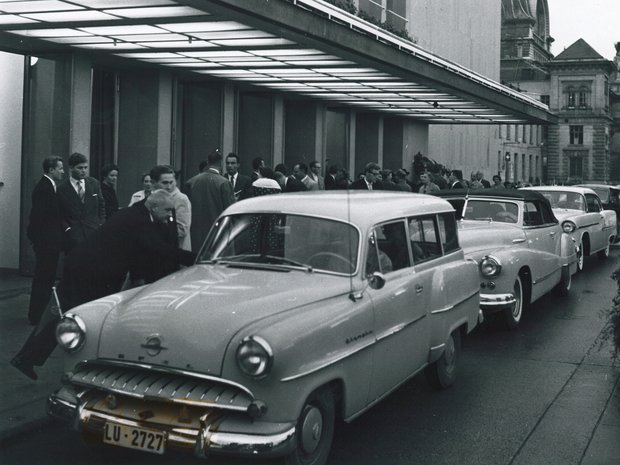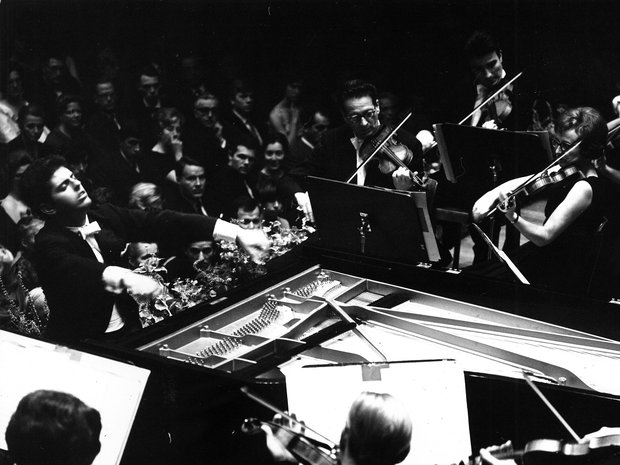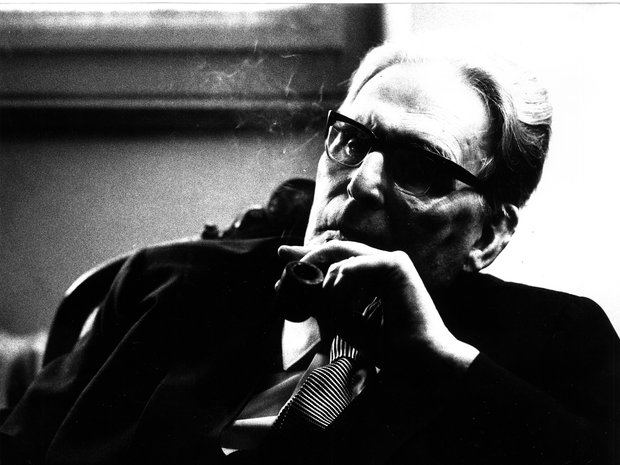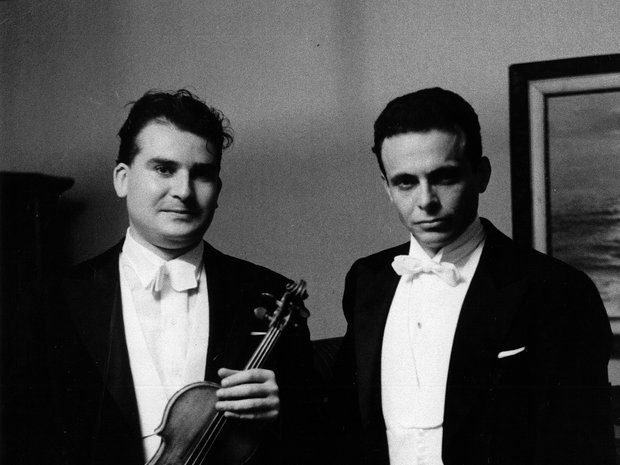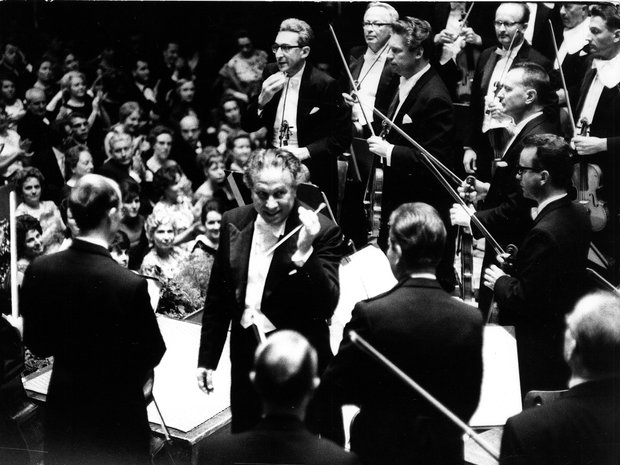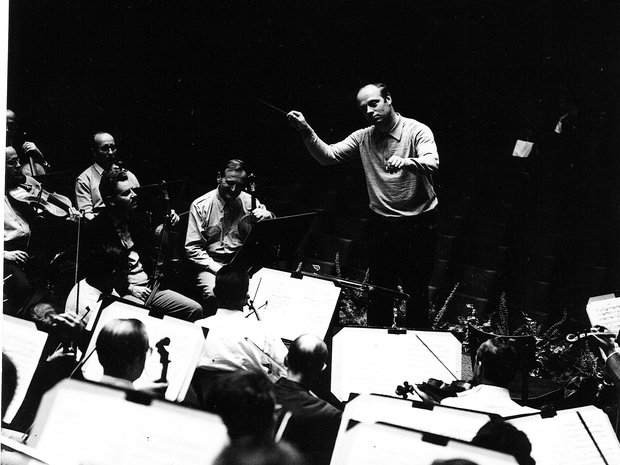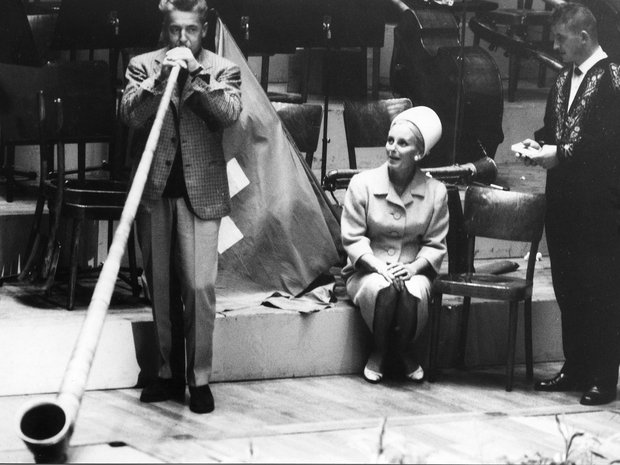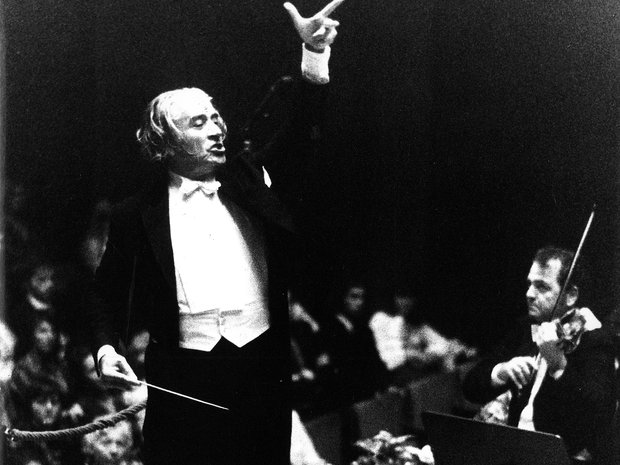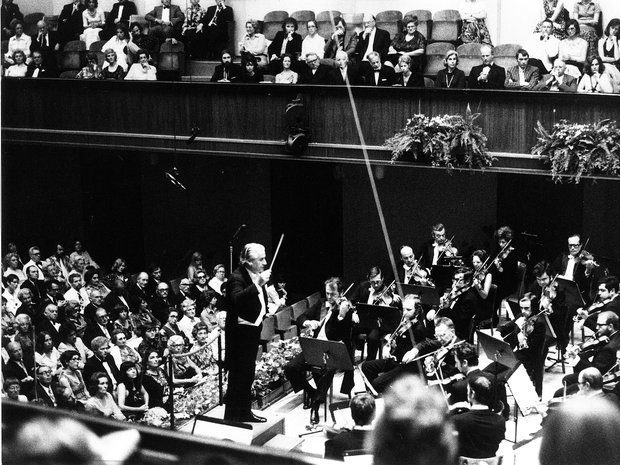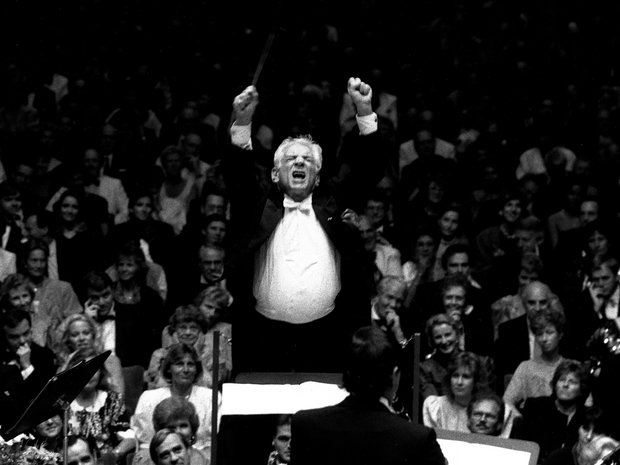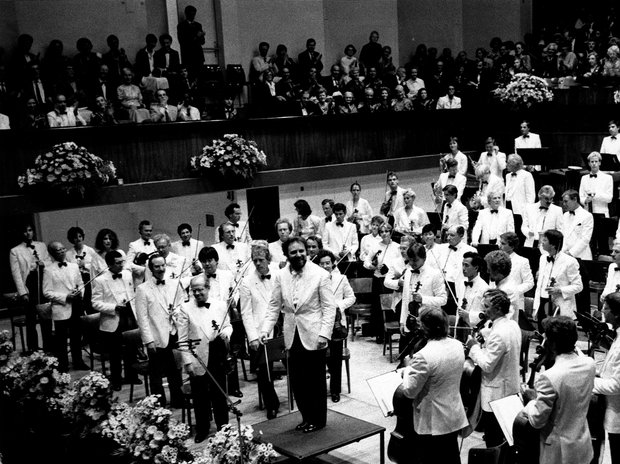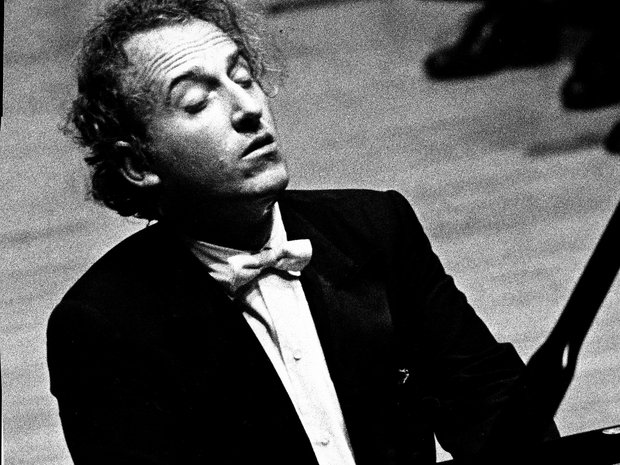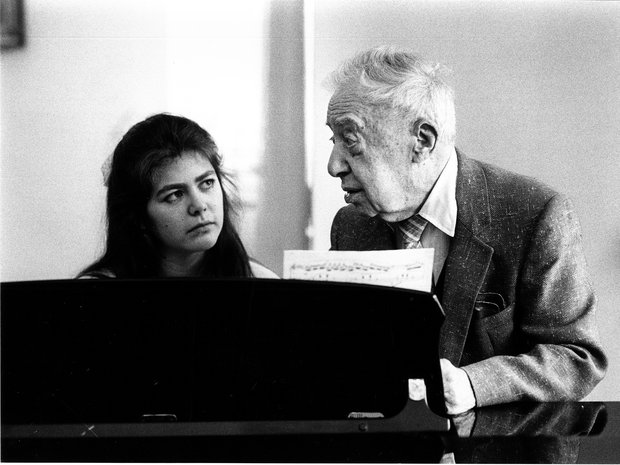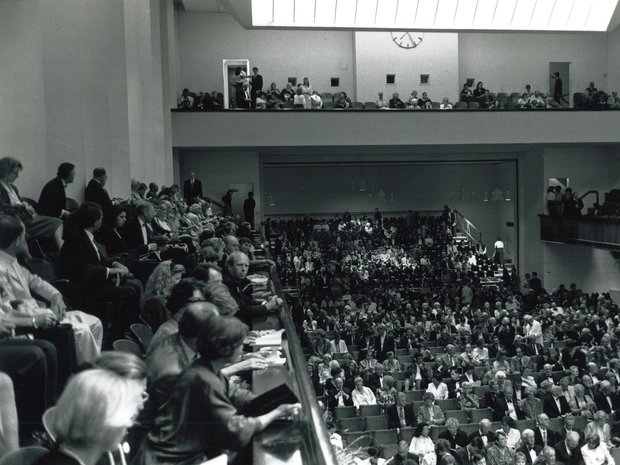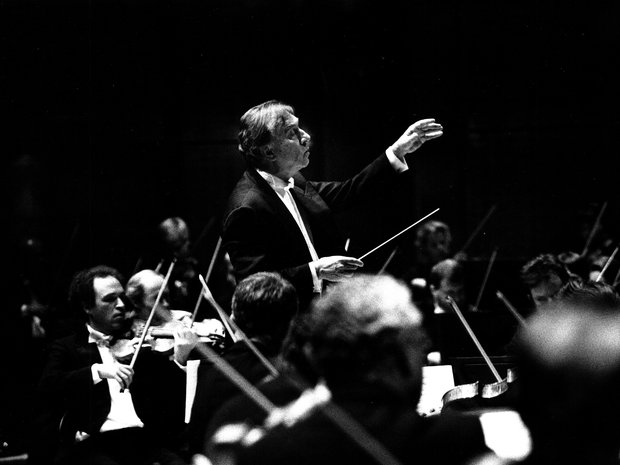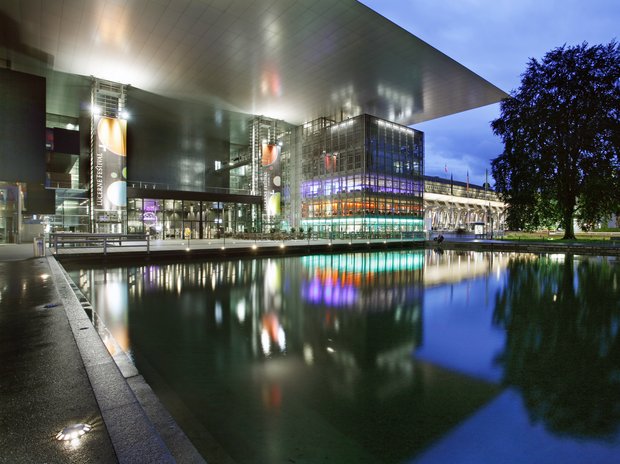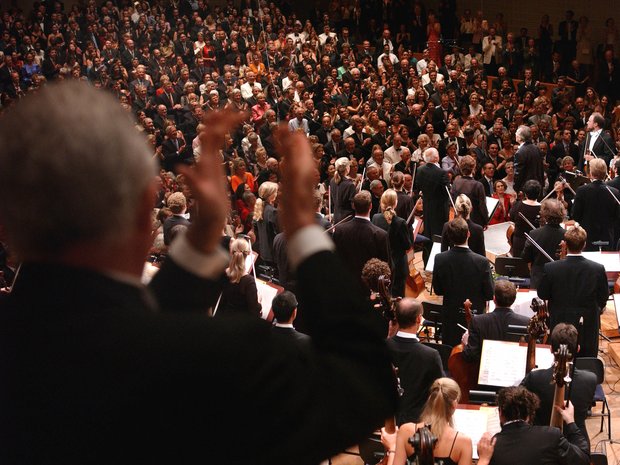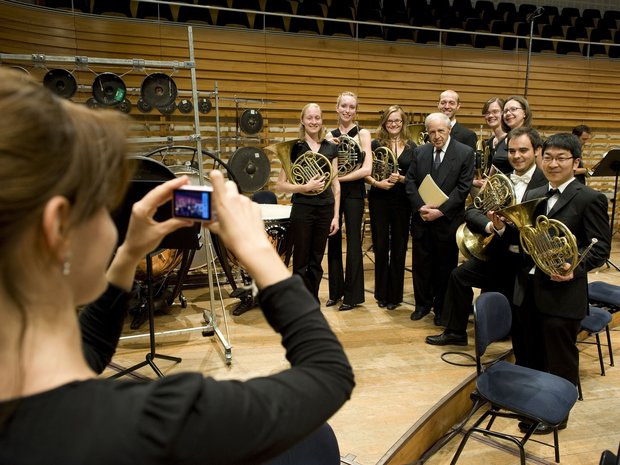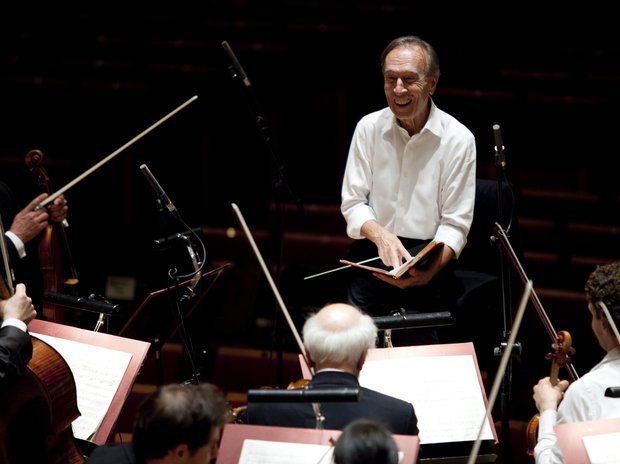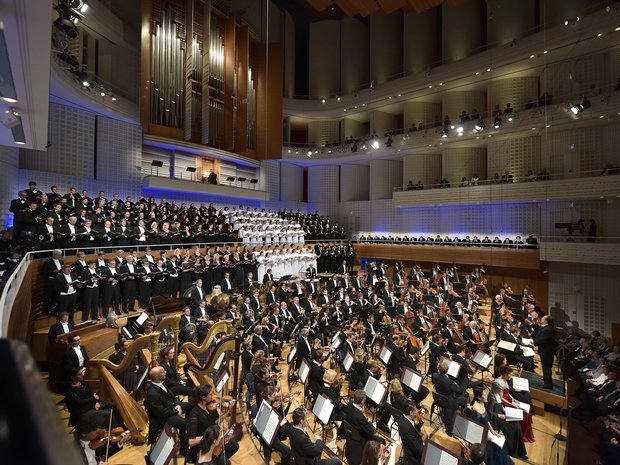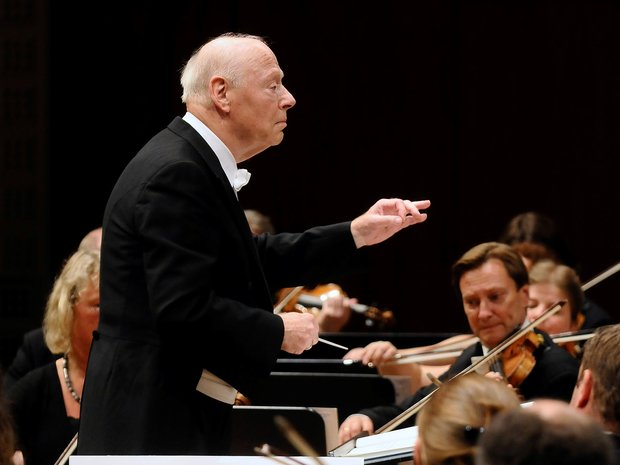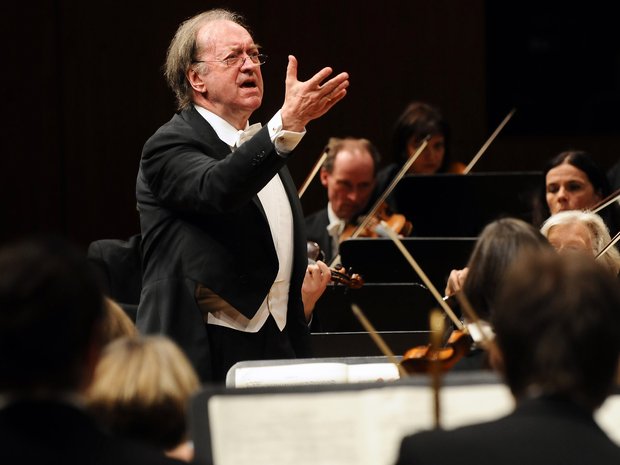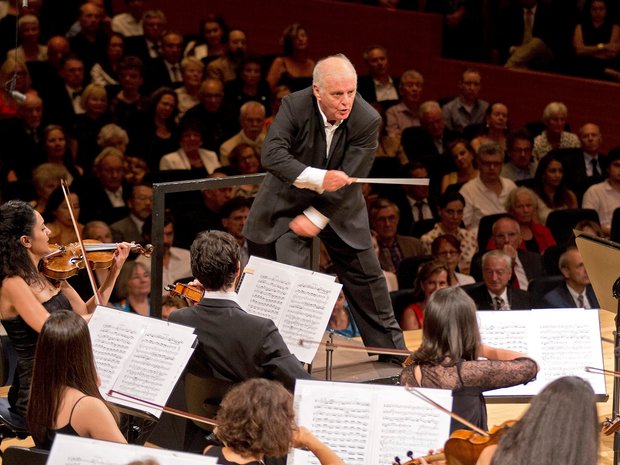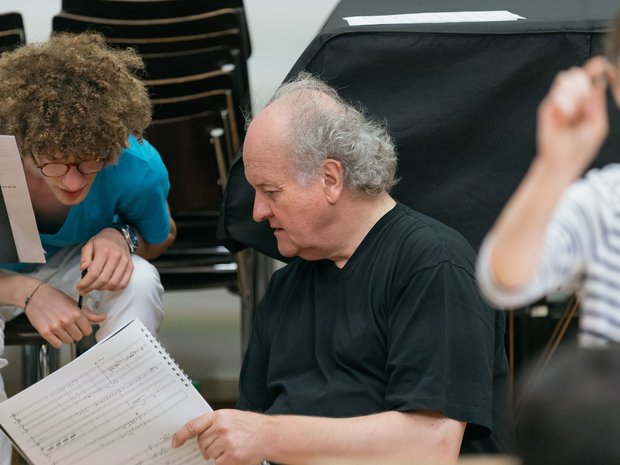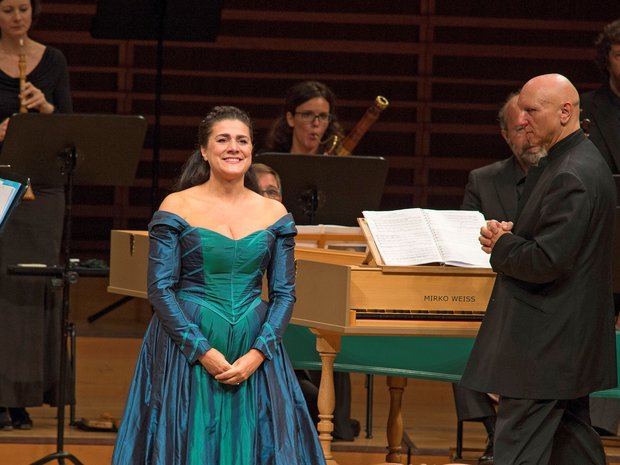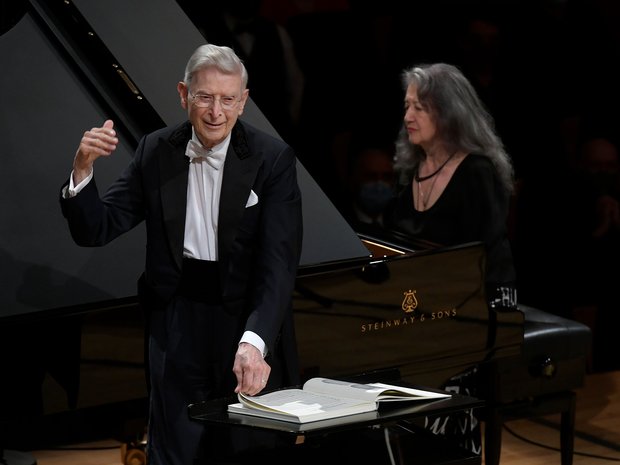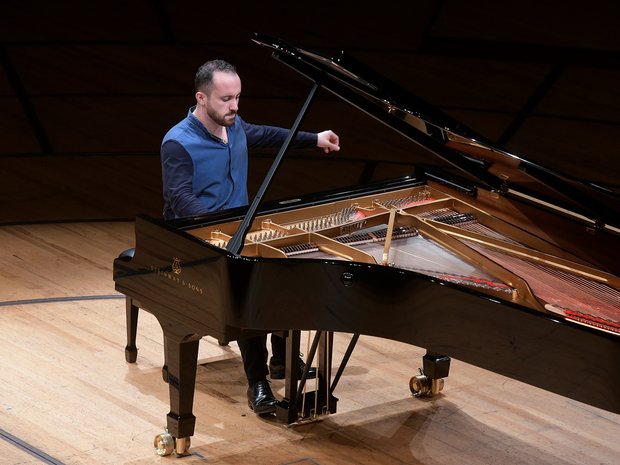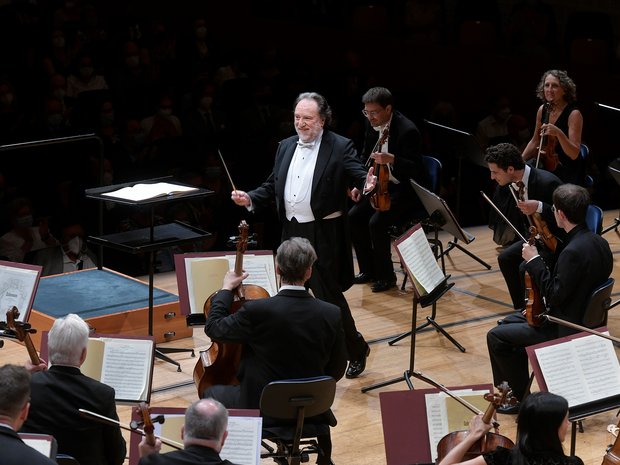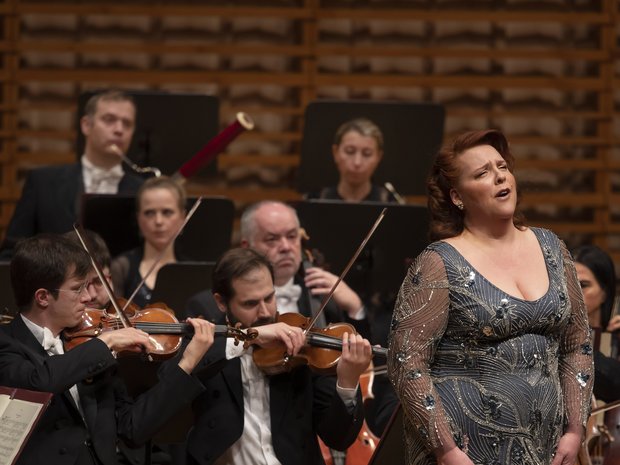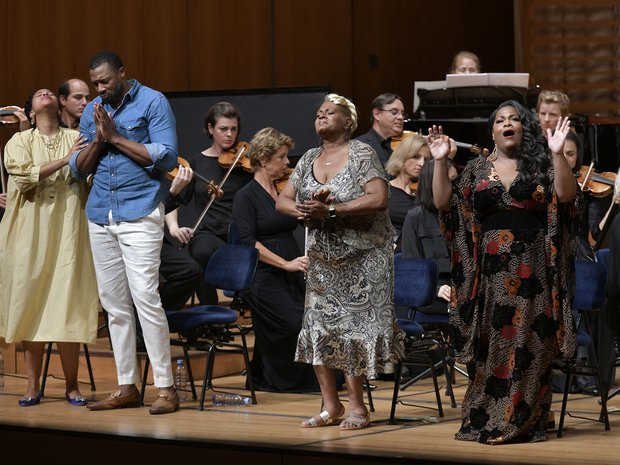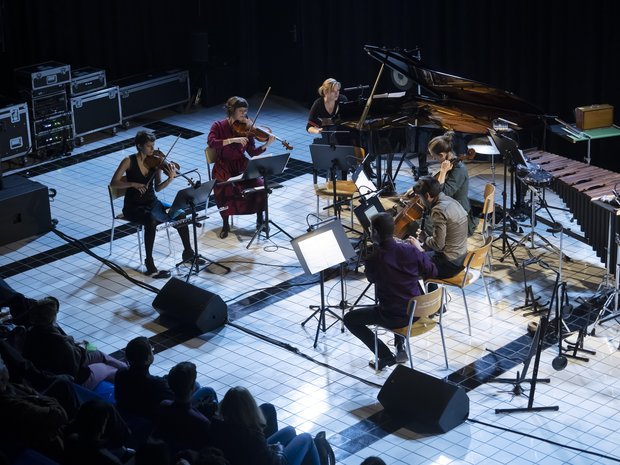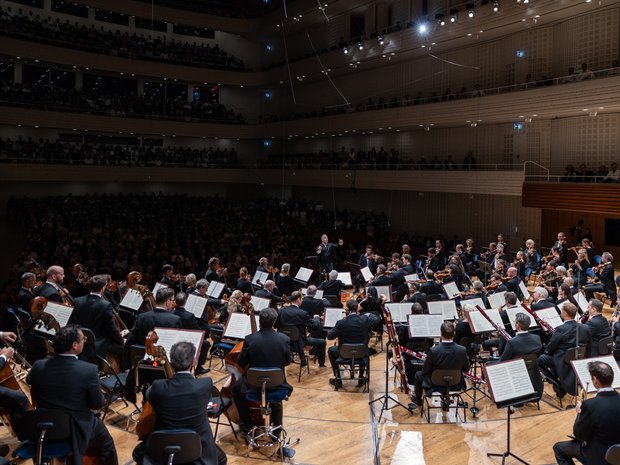Festivalgeschichte
Background
The Easter Festival at the Weinmarkt in Lucerne (from 1453 into the 16th century) is regarded as one of the outstanding contributions to the early history of German-language drama. In the 19th century the General Music Society of Switzerland (later: Swiss Union of Musicians) presents music festivals in Lucerne. From 1866 to 1872 Richard Wagner lives in nearby Tribschen, where he completes Die Meistersinger von Nürnberg and composes parts of the Ring. A decade before, while in exile in Zurich, he envisaged a festival on the shores of Lake Lucerne – an idea that is also later taken up by his son Siegfried around 1930. Richard Strauss and Max Reinhardt similarly consider Lucerne as a potential festival city before they found the Salzburg Festival. Even before music festival is founded, guest orchestras perform regularly in Lucerne under such leading conductors as Arthur Nikisch, Arturo Toscanini, and Wilhelm Furtwängler. Along with this tradition, Mayor Jakob Zimmerli – the leading force behind establishing a music festival, which will also give an impetus to the tourist industry – can also base this plan on a reliable infrastructure: the Kursaal in the Grand Casino Lucerne, the Saal of the Hotel Union, and the Kunst- und Kongresshaus, newly opened in 1933. Initial plans for a music festival are developed in 1936-37, inspired by the Swiss conductor Ernest Ansermet and in collaboration with Walter Schulthess, the director of the Zurich Concert Society AG. The Lucerne Kursaal Orchestra is foreseen as the ensemble, to be expanded with musicians from the Orchestre de la Suisse Romande, which Ansermet founded in 1918. Richard Strauss is asked to be the conductor but declines in 1938. In 1937 a “run-through” takes place in the Kursaal with the radio orchestras of Zurich and Lausanne led by Robert F. Denzler.
1938 –1939
1938
On 25 August 1938, Arturo Toscanini conducts a gala concert in Tribschen, for which an ad hoc orchestra comprising the finest musicians of the era is organized, the so-called “elite orchestra.” This performance arouses international attention and is regarded as the official beginning of the Internationale Musikfestwochen Lucerne (IMF), later known as Lucerne Festival – though the festival’s events, which also include chamber music and lieder recitals, had really already begun with a performance by Ernest Ansermet and Alfred Cortot on 18 July 1938. Additional orchestral concerts are conducted by Fritz Busch, Bruno Walter, and Willem Mengelberg. Lucerne thus responds to the ominous political situation, because artists like Toscanini, Busch, and Walter no longer wish to or are unable to perform in Bayreuth or in Salzburg on account of their political opinions or their origin. The success of this first festival inspires the desire to continue.
1939
In 1939 the IMF presents a splendid program: from July until September, Arturo Toscanini rents an apartment in the neighboring Kastanienbaum and conducts six concerts, stepping in for Bruno Walter for two of these. After rehearsals, the latter must cancel because of a family tragedy but returns to Lucerne in 1949 and 1950. Toscanini’s performance of the Verdi Requiem in the Jesuitenkirche is regarded as the highpoint of this second summer. Such soloists as Vladimir Horowitz, Pablo Casals, and Sergei Rachmaninoff, who from 1932 until 1939 resides at the Villa Senar in Hertenstein, give the event additional glamour. Immediately after the end of the festival, the Second World War breaks out.
1940–1949
1940
Because of the Second World War, the Internationale Musikfestwochen (IMF) does not take place in 1940. This is the only interruption in the history of the Festival. The Kunst- und Kongresshaus is taken over by the military.
1941
Performing at the first two Summer Festivals during the war is Milan’s La Scala Orchestra, which is led by Victor de Sabata, Antonio Guarneri, and Tullio Serafin and by the Swiss Robert F. Denzler and Othmar Schoeck.
1943
In reaction to the engagement of a guest orchestra from a Fascist country over the previous years, the Swiss Music Association and its Chairman Rudolf Leuzinger establish the Swiss Festival Orchestra. Until its dissolution in 1993, it is an artistic core of the Festival. Following the Opening Concert with Denzler are performances under Paul Kletzki, Ernest Ansermet, Hans Münch, and Carl Schuricht. Walter Strebi (Chairman of the IMF from 1953 to 1965) founds a series of master courses conducted at the Lucerne Conservatory, for which such teachers as Edwin Fischer and Carl Flesch, later also Enrico Mainardi, Georg Kulenkampff, and Wolfgang Schneiderhan, are enlisted. In 1945 Ernest Ansermet leads the first course in conducting – a tradition that such figures as Herbert von Karajan (1955), Rafael Kubelík (1982), Pierre Boulez (2003–2012), and Bernard Haitink (2011–2017) will continue.
1944
Two key future figures make their debuts at IMF. Wilhelm Furtwängler conducts the Swiss Festival Orchestra for the first time but cancels his participation the following year on account of anti-German protests in Zurich and Winterthur. After his “denazification” in 1947, the conductor, who now resides on Lake Geneva, plays a central role in the IMF until his death in 1954. In addition, a serenade concert by the Collegium Musicum Zurich is performed for the first time at the Löwendenkmal under the direction of Paul Sacher, who leads this popular evening event every summer until 1996.
1946
Two extra concerts by Arturo Toscanini with the Scala Orchestra in July, which is still before the beginning of the festival, turn out to be the maestro’s final appearances in Lucerne. The violinist Yehudi Menuhin debuts in Lucerne. The Swiss Festival Orchestra makes its first recording under studio conditions (Brahms’s Fourth Symphony under Kletzki), which is also the first record produced by a Swiss ensemble for the international market.
1948
The restrictions on travel that had been in place during the Second World War and in the immediate postwar years are removed, which leads to increasing internationalization of the IMF. Two important debuts conducting the Swiss Festival Orchestra: Rafael Kubelík, who has fled Czechoslovakia, leads the Opening Concert, while Herbert von Karajan also makes his first appearance – Lucerne is the first foreign city to invite the “denazified” musician. Both conductors go on to shape the IMF in the following decades.
1949
Das Lied von der Erde (under Kletzki) is the first work by Gustav Mahler to be heard as part of the Musikfestwochen. (Bruno Walter had had to cancel a scheduled performance of the Resurrection Symphony in 1939.)
1950–1959
1950
Dinu Lipatti’s final appearance at the Internationale Musikfestwochen Lucerne (IMF): a few months before his death, he joins Herbert von Karajan and the Swiss Festival Orchestra to play Mozart’s K. 467 Piano Concerto, the live recording of which acquires legendary status.
1951
The Vienna Symphony (under Karajan) becomes the first foreign ensemble to perform at the IMF after the Second World War. Igor Markevitch, André Cluytens, and Leopold Stokowski make their debuts in Lucerne (all of them conducing the Swiss Festival Orchestra).
1952
Ferenc Fricsay fills in for the ailing Wilhelm Furtwängler. Until his death in 1963, the Hungarian maestro regularly makes a striking mark as a guest artist at the IMF.
1953
The Lucerne-based attorney and member of the governing council Walter Strebi, a supporter and proactive force behind the Festival since its founding, becomes Chairman of the Organizational Committee (until 1965). He is immediately confronted with financial problems: while the press demands a stronger commitment to modern music, the audience is notably absent from bolder programs (even Karajan’s performance of Stravinsky’s Oedipus Rex). The young Guido Cantelli meanwhile takes them by storm.
1954
Long-simmering conflicts with the Swiss Festival Orchestra finally break out in public. The ensemble, which has played nearly every symphony concert since 1943, insists on dominating artistic matters; the IMF organizers in turn, because they hold chief responsibility for the Festival, demand the right to participate in creating the programs. Since no resolution is in sight, they summarily replace the “house orchestra” with the London Philharmonia Orchestra (with Cluytens, Edwin Fischer, Fricsay, Furtwängler, Karajan, and Kubelík). Following the Summer Festival, the collaboration with the newly formed Swiss Festival Orchestra will be relaunched.
1955
After Furtwängler’s death, Karajan becomes the new “figurehead” for the IMF: along with two concerts with the Swiss Festival Orchestra, he also offers a conducting course. The final concert is conducted by Otto Klemperer.
1956
Wolfgang Schneiderhan and Rudolf Baumgartner found the Festival Strings Lucerne and devote one of their first three concerts to contemporary music, launching of the “Musica Nova” series, which will continue for decades. Along with the Swiss Festival Orchestra, the Philharmonia Orchestra is again engaged as a guest orchestra with great success. This is the beginning of the unique parade of top international orchestras, which to this day remains a hallmark of the Festival’s high quality.
1957
First performance by the Vienna Philharmonic (with three concerts under Cluytens, Kubelík, and Dimitri Mitropoulos and an evening of chamber music), which has remained loyal to the IMF ever since.
1958
For this IMF anniversary year, the Berlin Philharmonic makes its first guest appearances (under Karajan, Klemperer, and Fritz Reiner). Through regular concerts, which become annual starting in the late 1960s and are under the direction of their music director Karajan (who now no longer performs with the Swiss Festival Orchestra), the Berlin Philharmonic becomes an audience magnet. Debut of Lorin Maazel. Arthur Rubinstein gives his first piano recital in Lucerne.
1959
For the 20th anniversary of the Lucerne Festival Choir, Sir Thomas Beecham conducts a performance of Messiah with a “mammoth gathering of forces.” Glenn Gould’s only appearance.
1960–1969
1960
To mark the 100th anniversary of Gustav Mahler’s birth, Otto Klemperer and the Philharmonia Orchestra perform Das Lied von der Erde. Dietrich Fischer-Dieskau sings Kindertotenlieder under George Szell. The NHK Symphony Orchestra from Tokyo comes to Lucerne for the first time.
1961
Ferenc Fricsay conducts the world premiere of Zoltán Kodály’s Symphony in C, written for the Swiss Festival Orchestra, which continues to commission contemporary composers regularly in the following years.
1963
As a memorial to the pianist Clara Haskil, a regular guest at the Internationale Musikfestwochen, the “Concours Clara Haskil” Piano Competition is offered for the first time – but without a winner being chosen. Additional competitions take place as part of the IMF in 1965 (winner: Christoph Eschenbach), 1967 (winner: Dinorah Varsi), and 1969 (no winner).
1964
The Pittsburgh Symphony Orchestra under William Steinberg become the first American ensemble to perform at the IMF. In the middle of the Cold War, a recital by the extraordinary Russian pianist Sviatoslav causes a sensation. The “Young Artists” series, which focuses on emerging talent, begins in spectacular fashion with Jacqueline du Pré and Peter Serkin.
1965
Walter Strebi becomes the first Honorary Chairman of the IMF, and the law professor Alois Troller is appointed his successor as Chairman (until 1971). Toller seeks to move away from the ossified programming conception which ultimately leads to a restructuring and professionalization of the IMF. The first appearance by the Bavaria Radio Symphony Orchestra (under Rafael Kubelík) makes the start of a close association that continues to this day.
1966
The establishment of the Foundation “Friends of the Internationale Musikfestwochen Lucerne” (today: Lucerne Festival Friends) enables those running the IMF to ensure substantial financial and moral support by interested private persons and business circles. Claudio Abbado, Daniel Barenboim, and Bernard Haitink all make their debuts – three emerging star conductors who will remain closely associated with the Festival as influential figures for decades.
1967
The Cleveland Orchestra (under George Szell and Karajan) becomes the second U.S.-American ensemble to appear at the IMF.
1968
To mark the IMF’s 30th anniversary, the program offerings are expanded to a total of 32 events, half of which are symphony concerts. The first appearance by the New York Philharmonic under Leonard Bernstein is especially sensational. On Alois Troller’s initiative, planning is begun for a new organization of the IMF in 1970: in order to professionalize the hitherto volunteer leadership, Rudolf Baumgartner is named artistic director to the Chairman, with Othmar Fries, the Director of Lucerne Traffic, as his administrative director. Opposition to the proposal comes mainly from the program commission hitherto in charge, but Toller is able to implement the desired innovations.
1969
One year after the bloody suppression of the “Prague Spring,” the Czech Philharmonic becomes the first orchestra from the Eastern bloc to perform in Lucerne, giving three concerts. The Czech exile Rafael Kubelík invites the musicians to a garden party and awards them a “medal commemorating freedom,” which is however swiftly confiscated by the accompanying functionaries. Walter Schulthess, who as an adviser has significantly influenced the IMF since it was founded, retires from the Organization Committee.
1970–1979
1970
Founding of the “Stiftung Internationale Musikfestwochen” and beginning of the Rudolf Baumgartner era. Since the new Artistic Director also heads the Conservatory and the Festival Strings Lucerne, an even closer association between these Lucerne music institutions is forged. He also establishes significant points of emphasis: one innovation is to have a thematic focus on which to base the Festival programming each year; modern music is moreover increasingly part of the picture, as in the Beethoven year 1970 by juxtaposing his nine symphonies with works from the 20th century. The Festival themes are initially oriented to composers or geographical perspectives, such as “Music by Swiss Composers” (1973) and “Spain as a Musical Country” (1976), Igor Stravinsky (1972) and Maurice Ravel (1975). The “Musica Nova” concerts are expanded into the “Perspectives” series, each of which focuses on a composer, so for example Mauricio Kagel, Iannis Xenakis, Karlheinz Stockhausen, Klaus Huber, György Ligeti, and Witold Lutosławski during the first several years. Following two last-minute cancellations in previous years, Arturo Benedetti Michelangeli gives his first (and only) recital.
1971
Mayor Hans Rudolf Meyer becomes Chairman of the IMF (until 1978). First piano recitals by Vladimir Ashkenazy and Radu Lupu (who steps in for Arturo Benedetti Michelangeli). The violinist Yehudi Menuhin and the Indian sitar virtuoso Ravi Shankar perform the “East and West” concert.
1972
To mark Igor Stravinsky’s 90th birthday, each of the 11 symphony concerts includes at least one of his works. First appearance by the Royal Concertgebouw Orchestra from Amsterdam. Last performance for the time being (Handel’s Messiah) in the Jesuitenkirche, which will remain closed for concerts until 1981 owing to renovations.
1973
The “Concours Clara Haskil” is moved to the pianist’s former place of residence in Vevey. At the same time the IMF strengthens its commitment to young performers and expands the “Young Artists” series into a platform for launching their careers – with appearances by the 13-year-old Anne-Sophie Mutter, Maria João Pires, Christian Tetzlaff, Thomas Zehetmair, Frank Peter Zimmermann, and the Hagen Quartet.
1974
The theme “Music of the Second Viennese School” is enthusiastically greeted by the press, but the gamble proves to be too big: in view of the low demand from the audience, the artistic direction must rethink its efforts and accentuate “moderate” modern music in order to prevent a financial debacle. Sergiu Celibidache conducts the Swiss Festival Orchestra for the first time – and requires eight rehearsals for Schoenberg’s Op. 31 Orchestra Variations!
1975
First appearances by Pierre Boulez, conducting the New York Philharmonic in two concerts
1976
Debut recital by Maurizio Pollini.
1977
In order to gain new audience members, the IMF for the first time offers a “Concert for the Elderly and the Disabled” as well as an open-air event for young people.
1978
Double anniversary: the 800th birthday of the City of Lucerne and the 40th anniversary of the IMF coincide. Othmar Fries becomes full administrative director of the IMF (until 1988).
1979
Werner Bühlmann replaces Hans Rudolf Meyer as Chairman of the IMF (until 1988). First guest performances by the Boston Symphony Orchestra (under Seiji Ozawa) and – the first time an ensemble from East Germany has been invited – the Staatskapelle Dresden (under Herbert Blomstedt).
1980–1989
1980
Following the dismissal of Rudolf Baumgartner, Ulrich Meyer-Schoellkopf, who is also the Director of the Stadttheater (until 1982) and Music Director of the General Music Society of Lucerne Orchestra (now known as the Lucerne Symphony Orchestra), is named the new Artistic Director (until 1991). He succeeds in consolidating the financial situation and in advancing the Internationale Musikfestwochen through a “policy of small steps.” In order to strengthen the IMF’s international network, he establishes an advisory board which includes Vladimir Ashkenazy, Rafael Kubelík, and Paul Sacher. The already established focus of each Festival year on a specific theme is continued.
1981
Vladimir Ashkenazy for the first time encourages the construction of a new concert hall. Over the following years, from private sources and benefit appearances by Ashkenazy and Kubelík, funds are acquired to hold a competition for ideas and to conduct preliminary planning, which is approved by Lucerne’s electorate in 1989.
1982
Queen Elizabeth II takes over patronage of the IMF, which is dedicate to the theme of “England.” Kubelík revives the master classes, which have since become rigidified, with a new course in performance for conductors.
1983
The outstanding “Perspectives” series “The Composer and His World” is devoted to the work of Pierre Boulez.
1984
Because of his quarrel with the Berlin Philharmonic, Herbert von Karajan conducts the Vienna Philharmonic; one year later he is again on the podium of “his” Berliners. Rafael Kubelík provides a splendid finale to the Festival theme of “Music from Czechoslovakia” with a complete performance of Smetana’s Má Vlast with the Bavarian Radio Symphony Orchestra. It will be his final Lucerne appearance.
1985
The programing celebrates the 300th birthdays of Johann Sebastian Bach, Georg Friedrich Handel, and Domenico Scarlatti. Claudio Abbado conducts the European Community Youth Orchestra in Mahler’s Resurrection Symphony – thus inaugurating what in future will be an increasing involvement with including youth orchestras.
1986
To mark Othmar Schoeck’s 100th birthday, the IMF again champions his work, including a concert performance and recording of his opera Massimila Doni.
1988
To mark its 50th anniversary, the IMF takes a look back over its own history: Ashkenazy and the Orchestre de la Suisse Romande repeat the program of the first Festival concert under Ernest Ansermet in 1938. The Chamber Orchestra of Europe meanwhile makes its Lucerne Debut under Abbado with a concert of works that, a half century before, Arturo Toscanini had selected for his legendary gala concert in Tribschen. Final Lucerne appearances by Karajan and Leonard Bernstein. Additionally, a significant innovation takes place: in reference to the medieval tradition of the Easter and Passion plays, an Easter Festival takes place for the first time.
1989
Georges Bucher becomes Chairman of the IMF (until 1998) and urges construction of a new concert hall. Together with Meyer-Schoellkopf, who after Othmar Fries’ retirement as Administrative Director takes on overall management of the entire Festival, he takes the first steps towards a sponsorship model. Shortly before the breakup of the Soviet Union, the thematic focus is on “Russia”; among the programs are first performances at the IMF of several of Dmitri Shostakovich’s symphonies. James Levine performs a Karajan memorial concert with the Berlin Philharmonic.
1990–1999
1990
First appearances by Christoph von Dohnányi, Michael Gielen, András Schiff, and Günter Wand.
1991
The second edition of the Easter Festival, which has been thoroughly planned, is canceled because the main orchestra expected to perform, the New York Philharmonic, abandons the trip on account of the First Gulf War. The summer honors two anniversaries: the 200th anniversary of Mozart’s death and “700 years of the Swiss Confederation.”
1992
Matthias Bamert takes over direction of the Internationale Musikfestwochen (until 1998). He is committed to partnerships with large businesses and establishes the Easter Festival as a second annual festival, which places special emphasis on sacred music and on concerts in Lucerne’s churches. He also carries out more experiments, expands the traditional theme into a “leitmotiv,” and opens the Festival up to a broad range of the public, for example through the Late Night series, midday concerts, and the “Festival within the Festival,” with a focus that changes each year, such as street or amateur music.
1993
Exactly 50 years after its founding, the era of the Swiss Festival Orchestra comes to an end with three concerts; the Lucerne Festival Choir, on the other hand, continues until 2000. The position of composer-in-residence, who is more prominently involved in the summer programming and commissioned to write a composition, replaces the composer portrait series introduced by Baumgartner. Alfred Schnittke becomes the first and is succeeded by such figures as Klaus Huber, Luciano Berio, Beat Furrer, Michael Jarrell, Wolfgang Rihm, and Heinz Holliger. Marking the 50th anniversary of the death of Sergei Rachmaninoff, his entire keyboard works are performed on a single day. First appearance by Mariss Jansons (conducting the Oslo Philharmonic Orchestra).
1994
The citizens of the City of Lucerne give assent in a plebiscite to reconstruction of the KKL. An initial attempt to form a new ensemble associated with the Festival fails (already operating under the name of the Lucerne Festival Orchestra). The concerts by this orchestra, which comprises former members of renowned youth orchestras and is led by Kurt Sanderling, Yehudi Menuhin, and Gennady Rozhdestvensky, generate little response from the public.
1996
Final concert in the old Kunsthaus with Giuseppe Sinopoli and the Vienna Philharmonic. Debuts of Simon Rattle (conducting the City of Birmingham Symphony Orchestra) and Nikolaus Harnoncourt, who from this point on appears each year at the Easter Festival with his Concentus Musicus (till 2012).
1997
The Kunsthaus is torn down, but the KKL Lucerne is not yet finished. Under leadership of the architect Max Schmid, the former factory hall of the von Moos Steel company is transformed into an acoustically outstanding concert hall which can be reached by a special train from Lucerne’s main train station – a “Festival dealing with adversity,” with a very special atmosphere.
1998
Just in time to mark the 60th birthday of the IMF, Claudio Abbado and the Berlin Philharmonic open the new concert hall on 19 August. The completion of the entire KKL complex takes until 2000. Other festivals visit as guest artists with their own productions, such as the Bayreuth Festival with parts of Götterdämmerung (under James Levine) and Die Meistersinger von Nürnberg (under Daniel Barenboim) and the Salzburg Festival with Messiaen’s Saint François d’Assise (under Kent Nagano). The KKL opens up new possibilities: the Piano Festival is the third Festival to be founded. Taking place annually in late November, it is devoted entirely to keyboard music.
1999
Jürg R. Reinshagen becomes Chairman of the Board of Directors of the IMF (until 2009), the violinist and cultural manager Michael Haefliger follows Bamert as Executive and Artistic Director of the Festival. Haefliger continues to focus on themes in the summer and implements numerous new ideas: he expands the Festival’s commitment in the realm of contemporary music and gradually expands its projects in the field of education (initially as the “Children’s Corner,” later as “Young” respective “Music for Future”). He moreover enhances the Festival’s international presence, for example by establishing the Circles of Friends abroad in such counties as the United States and Japan. Especially significant are the two new “pillars” he founds in 2003, which will shape the Festival: the ucerne Festival Orchestra, which he founds together with Claudio Abbado, and the Lucerne Festival Academy, which he develops with Pierre Boulez.
2000–2009
2000
The KKL Lucerne is now completely ready for business: as part of the summer Opening Concert on 17 August the new Goll organ in the grand concert hall is consecrated. To celebrate his 75th birthday, Pierre Boulez is in residence with the London Symphony Orchestra. Two awards that alternate annually are introduced to promote young talent: the “Prix Credit Suisse Jeunes Solistes” (starting in 2001) and the “Credit Suisse Young Artist Award,” which is given jointly by the Vienna Philharmonic, the Vienna Society of Friends of Music, and the Credit Suisse Foundation. The first winner of this award is Quirine Viersen. Other winners in the years following include Patricia Kopatchinskaja, Sol Gabetta, Martin Helmchen, Vilde Frang, and Kian Soltani.
2001
The name of the Internationale Musikfestwochen Lucerne is changed to Lucerne Festival. “Creation” is the theme of this summer, which is heralded by the poetic fire spectacle “the KKL in flames.” Other highlights are the Swiss premiere of Luigi Nono’s Prometeo (with the Ensemble Modern under Ingo Metzmacher) and the Lucerne premiere of Mahler’s Eighth Symphony (with Franz Welser-Möst and the Gustav Mahler Youth Orchestra). Sol Gabetta receives the first-ever “Prix Credit Suisse Jeunes Solistes.” Despite the terrorist attack of September 11, the Chicago Symphony Orchestra carries on with its Lucerne residency.
2002
First appearance by Christian Thielemann, who is a guest artist with the Munich Philharmonic at the Easter Festival. Pierre Boulez and Olga Neuwirth make their marks on the summer programming as composers-in-residence.
2003
Beginning of a new era: the Lucerne Festival Orchestra, founded by Claudio Abbado and Executive and Artistic Director Michael Haefliger, is introduced with a “concert de gala.” It comprises internationally acclaimed soloists, chamber musicians, music professors, and members of the Mahler Chamber Orchestra and links back to Arturo Toscanini’s legendary “elite orchestra” with which the history of the Festival began in 1938. With a performance of the Resurrection Symphony Abbado and his “orchestra of friends” launch their celebrated Mahler cycle; their concerts earn major media attention and are broadcast around the world. Additionally, Pierre Boulez conducts a Lucerne Festival Preview Academy.
2004
Mariss Jansons and the Bavarian Radio ensembles begin their annual residency at the Easter Festival. The Lucerne Festival Academy becomes firmly anchored in the Festival as a training institution for the music of the 20th and 21st centuries that is internationally unique. Harrison Birtwistle is the first winner of the Roche Commissions, a biennially awarded commission of major contemporary composers. The Piano Festival is for the first time expanded to include Piano Off-Stage, which features performances by international jazz pianists in selected bars and restaurants.
2005
The most devastating flood since 1910 forces the leaders of the Festival to cancel no fewer than seven concerts during the Summer Festival, which is shaped by such figures as composer-in-residence Helmut Lachenmann. Abbado and the Lucerne Festival Orchestra undertake their first tour to Rome. In the following years they will go on tour to such venues as Suntory Hall in Tokyo (2006), Carnegie Hall in New York (2007; Boulez and David Robertson in place of Abbado), and the Musikverein in Vienna (2008), as well as to the London Proms, Paris, Madrid, Hamburg, Baden-Baden, Ferrara, Moscow, and Beijing.
2006
Matthias Pintscher is introduced for the first time: together with HK Gruber, he makes a mark on the programming as composer-in-residence. Michael Gielen conducts the first complete performance in Lucerne of Schoenberg’s Gurre-Lieder.
2007
The Lucerne Festival Academy gives a performance of Stockhausen’s Gruppen, in which, along with Boulez, Peter Eötvös, and Jean Deroyer, three young graduates of the master class in conducting also participate: Pablo Heras-Casado, Kevin John Edusei, and Lin Liao. A new project inspired by Boulez is launched: the construction of a “salle modulable,” a flexible hall for music theater.
2008
In January, outside the time frame of the three Festivals, memorial concerts with the Berlin Philharmonic, Seiji Ozawa, and Anne-Sophie Mutter take place marking the 100th birthday of Herbert von Karajan. In the summer Bernard Haitink begins his regular Lucerne collaborations with the Chamber Orchestra of Europe with a major Beethoven cycle (until 2009), which is followed by performance series of the complete concertos and symphonies of Brahms (2011-12) and of Schumann (2014).
2009
Dr. Hubert Achermann becomes Chairman of the Lucerne Festival Foundation. In counterpoint to the Festival theme of “Nature,” in which the two composers-in-residence, Kaija Saariaho and Jörg Widmann, immerse themselves, the Lucerne Festival Academy focuses on works with live electronics, including Boulez’s Répons.
2010–2019
2010
The summer theme is “Eros” and includes several semi-staged opera performances: Claudio Abbado conducts the Lucerne Festival Orchestra in Beethoven’s Fidelio, and Esa-Pekka Salonen and the Philharmonia Orchestra perform Wagner’s Tristan und Isolde (with videos by Bill Viola). With numerous world premieres, the Swiss Tonkünstlerfest is integrated into the Summer Festival for the first time.
2011
In response to the catastrophic earthquake in Japan of 11 March, Executive and Artistic Director Michael Haefliger launches the Lucerne Festival ARK NOVA project. This is a mobile concert hall developed by Anish Kapoor and Arata Isozaki which is intended to contribute to the cultural rebuilding of the affected regions. Bernard Haitink begins his master class for young conductors during the Easter Festival. The multipart series “Pollini Perspectives” begins in the summer; it juxtaposes selected Beethoven sonatas with new works . The slogan “A Festival for Lucerne” underscores the Festival’s increased efforts to open up to a broader spectrum of the public. The offerings for children and young listeners are also expanded and refocused under the moniker “Young.” The Piano Festival is dedicated to Franz Liszt’s 200th birthday.
2012
Claudio Abbado introduces the Orchestra Mozart at Easter, the orchestra he has most recently founded. Nikolaus Harnoncourt makes his final guest visit. Following the Summer Festival, Pierre Boulez, the Lucerne Festival Academy, and the Ensemble intercontemporain take Boulez’s Pli selon pli on tour to Turin, Milan, Amsterdam, Paris, Munich, and London – these are also Boulez’s last performances conducting the Academy.
2013
At the Easter Festival Gustavo Dudamel and the Los Angeles Philharmonic present John Adams’s new oratorio, The Gospel of the Other Mary (staging: Peter Sellars), which is a Festival co-commission. In the summer Lucerne Festival celebrates its 75th anniversary with a focus on the theme of “Revolution.” Among the highlights are the first complete performance of Wagner’s Ring cycle in Lucerne (with Jonathan Nott and the Bamberg Symphony) and the “Anniversary Day,” which is attended by over 7,500 music lovers. At his final performance, Abbado conducts Schubert’s Unfinished and Bruckner’s Ninth Symphony. Lorin Maazel makes his final guest appearance. In September and October the inflatable concert hall Lucerne Festival ARK NOVA is constructed for the first time in Matsushima, Japan; over the next two years, the ARK NOVA tours to Sendai and Fukushima.
2014
Following the death of Abbado, who is honored at the Easter Festival with a memorial concert by “his” Lucerne Festival Orchestra, Andris Nelsons takes on directorship of the summer programs. Two newly founded projects are introduced to the public: the Festival’s own creative laboratory Young Performance, which develops new formats for young listeners; and the Lucerne Festival Alumni, the international network of former Academy participants.
2015
To mark the 90th birthday of its founder and director, the Lucerne Festival Academy joins with the Ensemble intercontemporain to organize a “Day for Pierre Boulez”. Composer-in-residence Tod Machover presents his Symphony for Lucerne, a musical portrait of the city created in close collaboration with the inhabitants of Lucerne. At the end of the Summer Festival, the Lucerne Festival Orchestra and Andris Nelsons embark on a major European tour. The Piano Festival introduces a new event: over several concerts, the first-ever “Day of the Keyboard” gives the spotlight to the KKL’s Goll organ.
2016
Riccardo Chailly commences his tenure as Music Director of the Lucerne Festival Orchestra with Mahler’s Eighth Symphony. After Boulez dies in January, Wolfgang Rihm succeeds him as Artistic Director of the Lucerne Festival Academy. With the theme of “PrimaDonna,” the Summer Festival explores the roles of women in music life, bringing female composers, soloists, and conductors into focus. No fewer than six female conductors appear at the first-ever “Special Event Day,” which is a day-long music marathon in the KKL Lucerne. Bernard Haitink and Daniel Barenboim celebrate the 50th anniversary of their Lucerne stage debuts, and Anne-Sophie Mutter and Maurizio Pollini mark 40 years of association with the Festival.
2017
Teodor Currentzis returns to the Easter Festival as artist-in-residence, and Mariss Jansons conducts the Swiss premiere of Rihm’s Requiem-Strophen – the inauguration of a new series in Lucerne, the räsonanz Donor Concerts. Riccardo Chailly and the Lucerne Festival Orchestra undertake their first tour together, which includes stops in Japan, Korea, and China. With a focus on the theme of “Identity,” the Summer Festival explores the controversial issues of globalization, migration, and contemporary isolationism through initiatives such as projects involving refugees. John Eliot Gardiner pays tribute to the 450th birthday of Claudio Monteverdi with performances of his three surviving operas. The Vienna Philharmonic celebrates the 60th anniversary of its Lucerne debut. The Shanghai Symphony Orchestra becomes the first Chinese ensemble to perform at the Festival. The Lucerne Festival Academy presents Friedrich Cerha’s monumental orchestral cycle Spiegel in the Swiss premiere of the complete work and also performs it abroad on tour.
2018
The Easter Festival turns 30, the Piano Festival celebrates its 20th anniversary, and the Summer Festival revolves around the theme of “Childhood,” featuring works composed especially for children or in which composers recall their childhood – including, naturally, special performance formats aimed at young and very young listeners. The Berlin Philharmonic celebrates the 60th anniversary of its Lucerne debut, appearing for the very first time with Kirill Petrenko on the podium. Sir Simon Rattle and the London Symphony Orchestra join with the Lucerne Festival Academy to perform Karlheinz Stockhausen's Gruppen as part of the major retrospective titled “Kosmos Stockhausen.” “Artiste étoiles” Sol Gabetta and Dan Tanson are an integral part of the programming, as is composer-in-residence Fritz Hauser.
2019
In keeping with the theme of “Power,” Teodor Currentzis concludes the Summer Festival with Mozart’s three Da Ponte operas, collaborating for the first time with Cecilia Bartoli. Leonidas Kavakos is the “artiste étoile” and Thomas Kessler the composer-in-residence. Igor Levit launches his cycle of the complete Beethoven sonatas. And Bernard Haitink bids farewell to the stage in a concert conducting the Vienna Philharmonic. The Lucerne Festival Orchestra and Riccardo Chailly, who also conducts the Lucerne Festival Alumni for the first time, begin a Rachmaninoff cycle and go on tour in October to the Scala in Milan, Beijing, and Shanghai, where they perform in a residency lasting several days. The Easter and Piano Festivals take place for the very last time: following the 2019 editions, these two festivals are to be replaced by new short festivals starting in 2020.
2020–2029
2020
An extraordinary year: the coronavirus pandemic forces all three festivals that had been planned to be cancelled. This affects both of the newly launched musical weekends, one in the spring (featuring Teodor Currentzis) and one in the fall (showcasing Igor Levit and Patricia Kopatchinskaja), as well as the Summer Festival programmed around the theme of “Joy.” Instead, a ten-day alternative festival titled “Life Is Live” is organized within a very short time frame and held in August, in which Herbert Blomstedt conducts the Lucerne Festival Orchestra for the first time and, together with Martha Argerich, offers two all-Beethoven concerts. Igor Levit continues his cycle of the Beethoven sonatas. Other guest artists include Cecilia Bartoli, Mauro Peter, the Credit Suisse Young Artist Award winner Valentine Michaud, and an ensemble of the Lucerne Festival Alumni. Peter Conradin Zumthor creates a sound installation using the church bells of Lucerne. In addition, the Festival expands its digital offerings under the rubric “Connected.”
2021
This year continues to be affected by the coronavirus pandemic. The Spring Festival featuring Sir András Schiff cannot go forward, and the Summer Festival has to be rescheduled several times. Lucerne's Summer Festival is devoted to the theme "Crazy" and lasts the usual five weeks, but the concerts are given without intermission and without the larger orchestras. The pianist Yuja Wang is featured as the "artiste étoile," and Rebecca Saunders's participation as composer-in-residence includes the world premiere of her piano concerto to an utterance, which had originally been planned for 2020. The Lucerne Festival Contemporary Orchestra (LFCO), newly founded as a counterpart to the Lucerne Festival Orchestra to focus on new and contemporary music, performs for the first time this summer. The LFCO comprises members of the Academy network and inaugurates a new festival format that it will develop and perform each fall: Lucerne Festival Forward. The inaugural festival is given in the fall of 2021 and explores the theme "Networks."
2022
Premiere: Riccardo Chailly and the Lucerne Festival Orchestra became guests not only in summer but, for the first time in Festival history, in springtime as well with a residency in which they presented the first part of a Mendelssohn Festival on Palm Sunday weekend. Together with Yulianna Avdeeva, Anne-Sophie Mutter, and Kian Soltani, soloists from the orchestra also performed a benefit concert for Ukraine as a sign of solidarity against the Russian war of aggression. The Summer Festival’s theme was “Diversity” and pleaded for greater representation of diverse communities in the world of classical music. The focus was on women and Black composers and performers in particular. Featured as “artistes étoiles” were the soprano Golda Schultz and the multi-instrumentalist and composer Tyshawn Sorey. The composer-in-residence was Thomas Adès, whose new Air Anne-Sophie Mutter premiered with the Lucerne Festival Contemporary Orchestra (LFCO). Other highlights: the debuts of both orchestras of the Chineke! Foundation and the first Festival performance of Gershwin’s Porgy and Bess (with the NDR Elbphilharmonie Orchestra under Alan Gilbert).
2023
May is a time for new beginnings, including the inauguration of Piano Fest, curated by and featuring Igor Levit, which takes place for the first time over an extended weekend. It spans a broad pianistic spectrum, from classical music to jazz. Earlier in the year, the Lucerne Festival Orchestra delights audiences with its spring residency, which presents the second and concluding part of the Mendelssohn Festival: Iván Fischer and Andrés Orozco-Estrada, respectively, conduct Mendelssohn’s First Symphony and symphonic cantata Lobgesang in place of Riccardo Chailly, who was ill. “Paradise” is the theme of the Summer Festival, which explores various ideas and images related to the concept of paradise that have inspired composers throughout the centuries, including reflections on the endangered paradise that we humans inhabit: the Earth. To close the year, the Forward Festival in November focuses on works that combine music and film, such as Fausto Romitelli’s video opera An Index of Metals and music to paintings by Gerhard Richter.
2024
Two conductors stood on the podium of the Lucerne Festival Orchestra for the first time: Pablo Heras-Casado at the Spring Festival, which focused on Ludwig van Beethoven, and Klaus Mäkelä during the summer. Through such new formats beyond the concert hall as house concerts and post-concert talks, the Summer Festival sought to spark curiosity (the summer’s overall theme) with regard to classical music. At the same time, this edition of the Summer Festival paid homage to the 20th anniversary of the Lucerne Festival Academy and its “curiosity about what is new” – and also grieved for the death of the Academy’s long-standing director Wolfgang Rihm. Igor Levit appeared at the Piano Fest in a solo recital, in a concert with the Berliner Barock Solisten, and in a duo with his master student Lukas Sternath; he also invited the rapper Danger Dan to perform. At the Forward Festival in the fall, Patricia Kopatchinskaja made two guest appearances. One of these presented her new staged concert, Dona nobis pacem, her response to the wars in Ukraine, the Middle East, and elsewhere, and involved a collaboration with the choir from “Prostir,” the Ukrainian Cultural Center in Lucerne.
